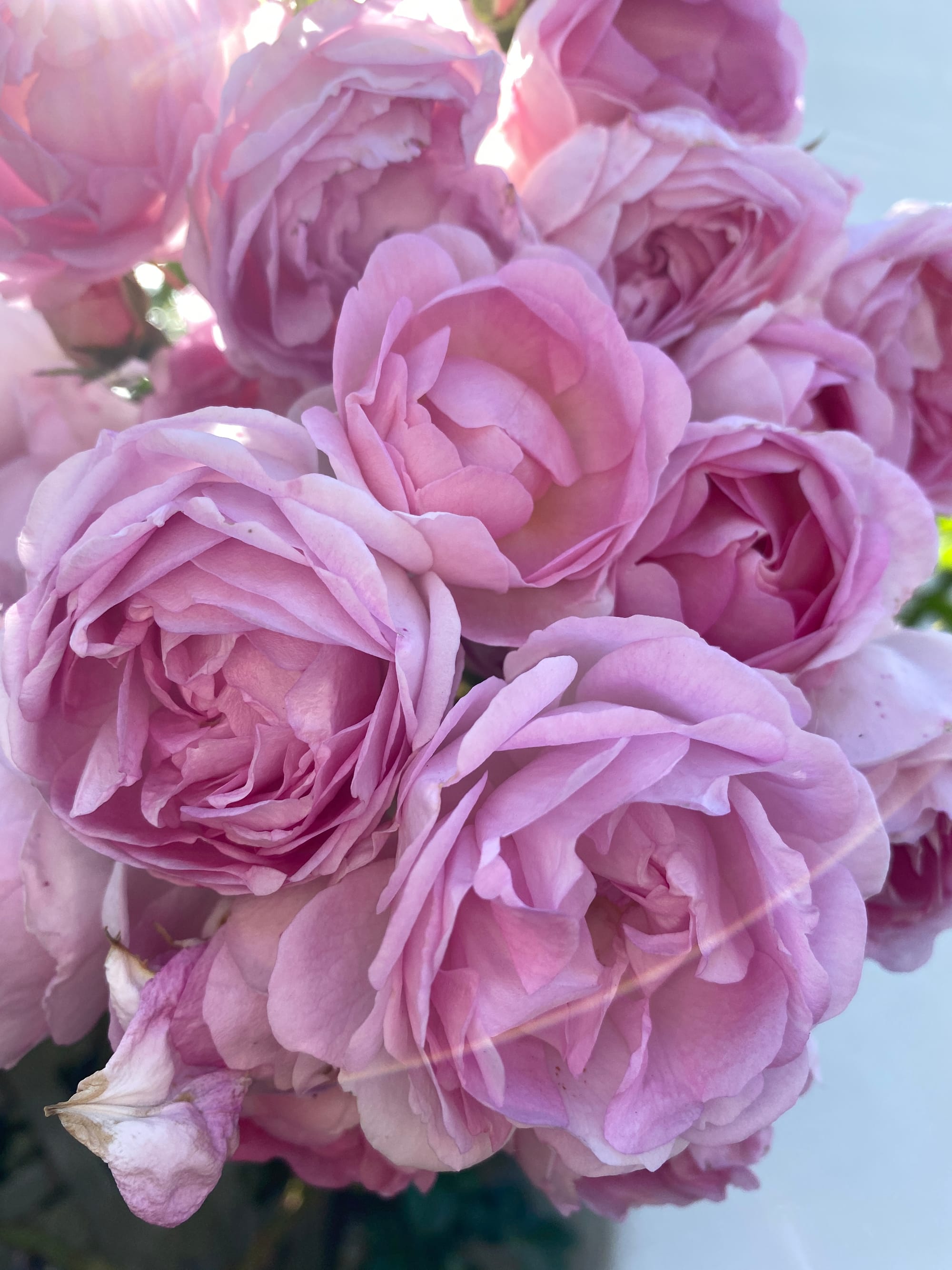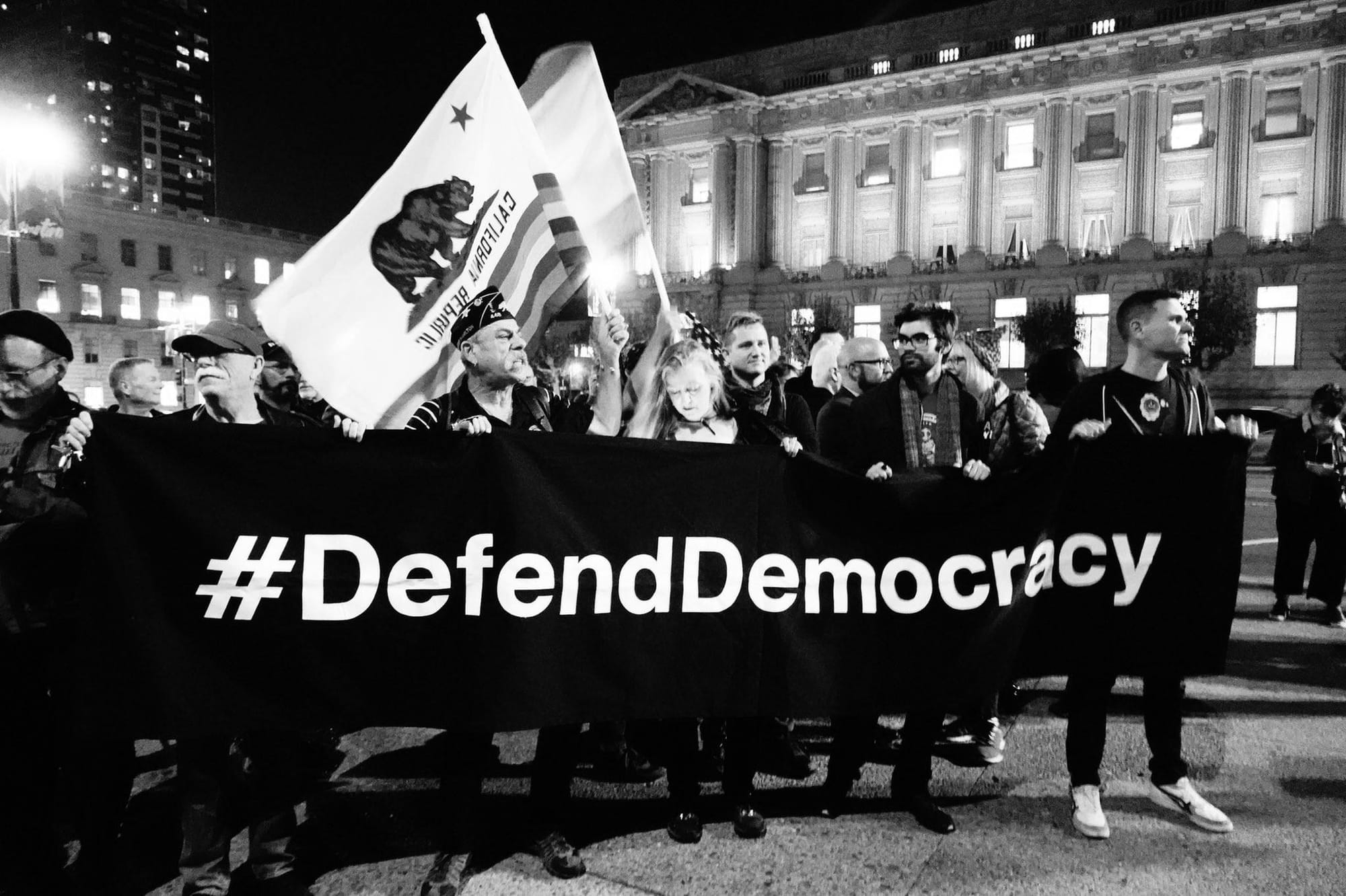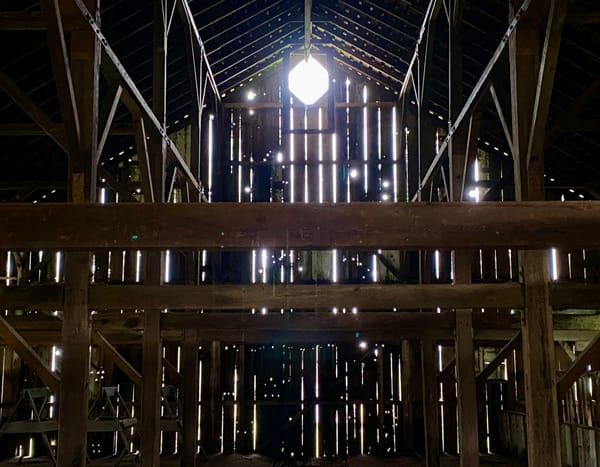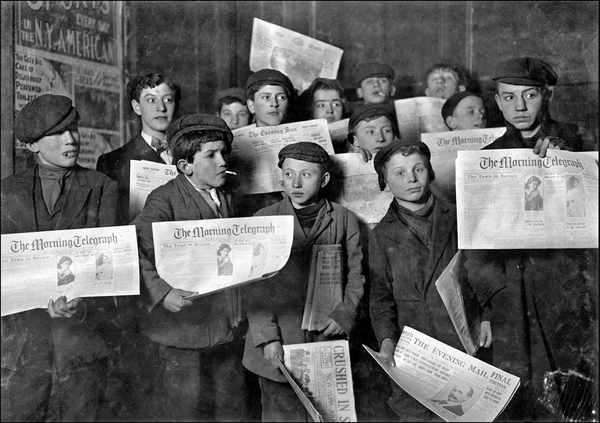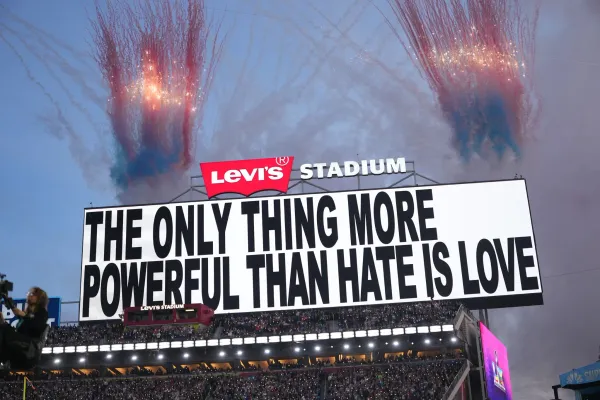Circuses vs. Roses: Notes on Pleasure and Scold Culture

Someone made this extra-grumpy meme about the fact that football player and podcaster Travis Kelce proposed to pop superstar Taylor Swift and now they're engaged, or rather about the fact that of course lots of people and media outlets are paying lots of attention, which Grumpy Meme believes is an incorrect use of our time. As some smart people pointed out to me, someone spent a lot of time making this admonition not to spend our time thinking about what the maker clearly spent time thinking about. Bread and circuses – to be clear, I have never actually watched a football game, and while I like Swift's lyrical gifts, I haven't listened to her much. But about that bread-and-circuses part of the meme:
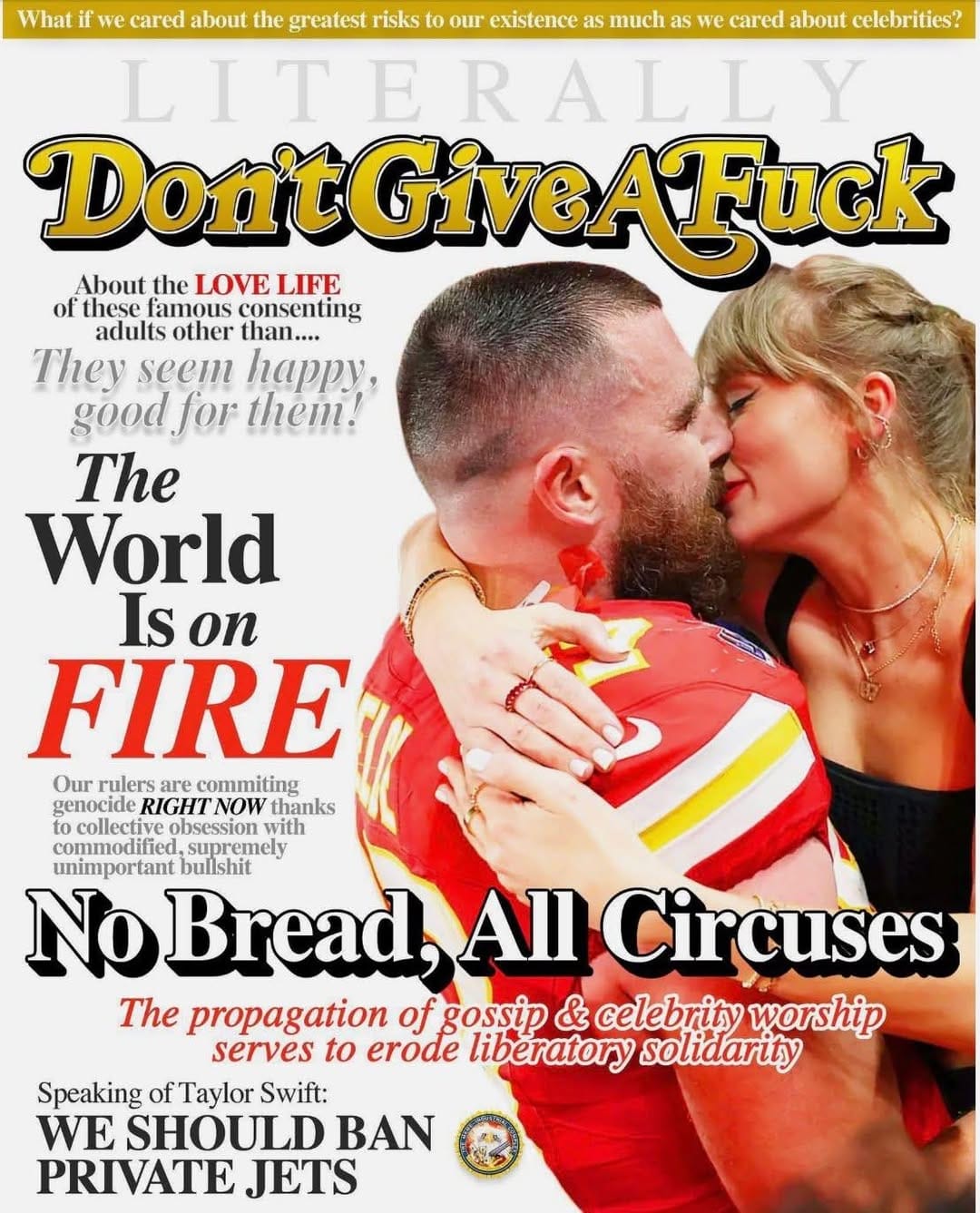
"The phrase bread and circuses is an inaccurate translation of Latin panem and circenses (literally bread and circus games) as used by the Roman poet Juvenal (Decimus Iunius Iuvenalis – circa 60-circa 140) in Satire X... Juvenal denounces the fact that the Roman populace has relinquished its civic duties for the free grain and circus games provided by those seeking, or in, power," says a website, while a dictionary defines the phrase as meaning "extravagant entertainment, offered as an expedient means of pacifying discontent or diverting attention from a source of grievance."
It is true that there are a lot of people paying attention to a lot of things besides the triple crisis of authoritarianism, the climate crisis, and Silicon Valley's sinister plans for us all. But it is also true that some of the people actually doing useful things about them may also have recreational moments here and there, whether they take a bubble bath or cook a luxurious dinner or watch a movie. Or snack on some pop gossip. We can do both.
I enjoyed reading about the superstar engagement hoopla and looking at the highly-staged instagram pictures, and yet my grievances – and more than that, passionate commitments – are intact and ready to roll. I perused the articles yesterday, specifically before finishing my questions for Bill McKibben about his magnificent (yet concise!) and encouraging new book Here Comes the Sun, about the solar-energy revolution unfolding, so that we could do a zoom launch of the book with Third Act, the climate group he founded and on whose board I sit along with him. Because even though I squander some of my time on trivialities, I'm a longtime climate activist and donor (and I want to write something for you soon about Bill's book).
The counter to the phrase "bread and circuses" is "bread and roses." It makes clear that pleasures are not necessarily distractions or superfluities, and we don't need to condemn them, as the former phrase suggests. I wrote in my book Orwell's Roses about the origin of the latter phrase in 1910, in a speech and then a magazine report by Helen Todd, a campaigner for women's right to vote:
She reflected in her magazine report on the phrase that was to become a refrain for the suffrage movement, the labor movement, and then for radicals of the 1970s and after, declaring that women’s votes would “go toward helping forward the time when life’s Bread, which is home, shelter and security, and the Roses of life, music, education, nature and books, shall be the heritage of every child that is born in the country, in the government of which she has a voice. There will be no prisons, no scaffolds, no children in factories, no girls driven on the street to earn their bread, in the day when there shall be ‘Bread for all, and Roses too.’
Bread fed the body, roses fed something subtler: not just hearts, but imaginations, psyches, senses, identities. It was a pretty slogan but a fierce argument that more than survival and bodily well-being were needed and were being demanded as a right. It was equally an argument against the idea that everything that human beings need can be reduced to quantifiable, tangible goods and conditions. Roses in these declarations stood for the way that human beings are complex, desires are irreducible, that what sustains us is often subtle and elusive.
I have been blessed to be around drag queens, who are clearly dedicated to the more baroque possibilities of eyeliner and hairspray, often make much of being gossipy about celebrities even when they're not dressing up as them, and who are often the most dedicated and valiant organizers around. So I know frivolity and seriousness can be complementary, not oppositional, and while some of us might like wholesome pre-approved recreational activities, some of us like stuff that's considered shallow, campy, trite, or pop.
Orwell noted in his column in the left-wing magazine Tribune, "last time I mentioned flowers in this column an indignant lady wrote in to say that flowers are bourgeois.” She apparently meant that he and we should not pay attention to flowers, and that pleasure and beauty were bourgeois. I wrote Orwell's Roses in part because I was so interested in what it meant that the twentieth century's leading antifascist writer was also a passionate gardener who took immense pleasure in flowers, gardening, animals both domestic and wild, country life, a good cup of tea, a good mug of beer, pubs, a certain kind of racy-joke postcard, and junk shops, among other things.
He wrote, in a passage that has served as my credo: But I could not do the work of writing a book, or even a long magazine article, if it were not also an aesthetic experience. Anyone who cares to examine my work will see that even when it is downright propaganda it contains much that a full-time politician would consider irrelevant. So long as I remain alive and well I shall continue to feel strongly about prose style, to love the surface of the earth, and to take a pleasure in solid objects and scraps of useless information. It is no use trying to suppress that side of myself. The job is to reconcile my ingrained likes and dislikes with the essentially public, non-individual activities that this age forces on all of us.
What the artist Helen Stickler just dubbed Scold Culture in response to my initial post on this matter insists that we should not reconcile but suppress that side of ourselves that likes these scraps of useless information. I guess that it means we should be 24/7 fighting fascists, but in fact no one can do that 24/7; everyone needs time off to recharge, whether it's spent manuring the roses or perusing the tabloids. The people who think they're 24/7 fascism fighters are often fighting their allies or potential recruits by scolding them about what they should be doing, which does not, in most cases, encourage them to do it; it encourages them to avoid scolds. That is, they are not recruiting people to activism and they are not supporting those who are active.
Anyway, I saw the meme on social media, and I wrote: my brain can accommodate fluff and issues with gravity, and Taylor and Travis are actually political in meaningful ways (which is not the same as perfect in every way, I'll add to fend off the puritans; I am not arguing for their beatification, just for the legitimacy of giving 15 minutes to this upbeat drama). For starters, it upsets the MAGA/manosphere that a hugely powerful, successful woman can be desired by and happy with a manly man (she makes a lot more money than him and he's apparently okay with that) and vice-versa. Women are too often told they can't have love if they have power and agency and an independent mind, and too many men are not okay with women who do have that stuff.
Kelce has made it clear he's proud of her; it might be a low bar to say that makes him a feminist. That makes him just a normal healthy person amidst all the men who can't cope with women who fail to hide their lights under bushels. Virginia Woolf wrote “Women have served all these centuries as looking glasses possessing the magic and delicious power of reflecting the figure of man at twice its natural size," but maybe some women, lots of us actually, don't want to be magnifying mirrors if that requires us to get small. And Swift is huge professionally (he's huge physically).
She's been a role model for young women, especially when, about a decade ago, she countersued the radio-station employee who groped her during a meet-and-greet photo, got fired when she told his employer, and sued her because he blamed her for it. She turned the trial into an arena for a brilliant performance of refusal to take responsibility for the consequences of an abuser's actions.
That will almost certainly be my all-time favorite performance of hers, and it was a significant event during that glorious feminist insurrection that began around 2013, reached a crescendo in 2017 with #metoo, and has ongoing positive consequences (just reading the piece in the screenshot below is a reminder how normal it was a dozen years ago to make public noises about how sad it was that some rapist's "bright future" was being wrecked just because he brutally assaulted someone with ruthless disregard for her humanity and right to self-determination).
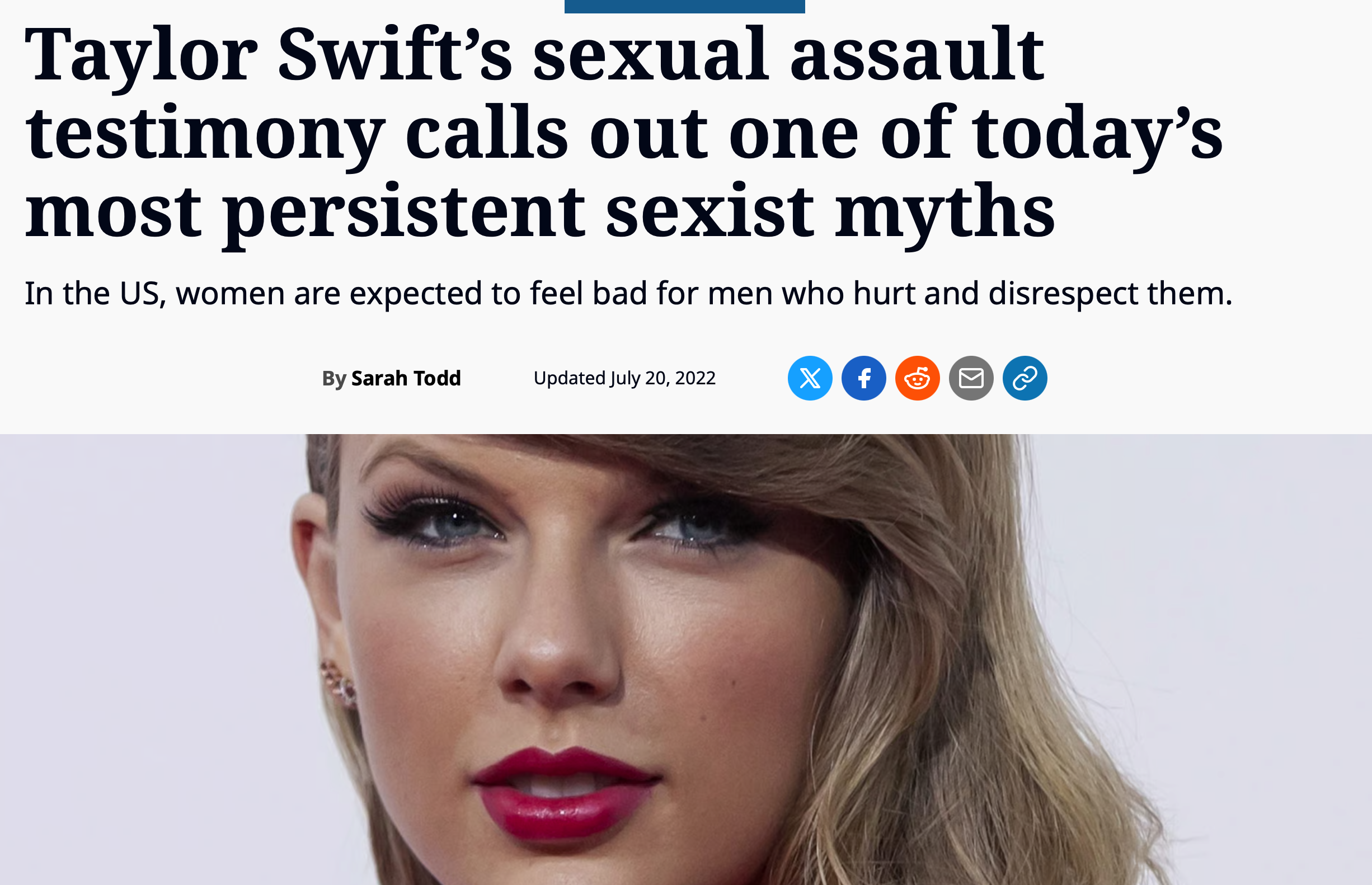
She's a big donor to disaster relief in the Southeast, gave her workers huge bonuses on the Eras tour and reportedly treats them well, and donated hugely to food banks at the US cities on her tour schedule. She has been an advocate for women's rights and LGBTQ issues, spoke out on reproductive rights and endorsed Kamala Harris. She's also successfully urged a lot of voters to register and helped lead them to the places to do it and it's pretty clear to me and to MAGA that her followers are not registering Republican. This is mild stuff, but it does mean that she is not an entirely apolitical phenomena, even if she's not Che Guevara. (Nobody thinks she's Che Guevara, even if there are people eager to tell us she's not and by the way, I'm not actually in charge of her political life, which would be somewhat different if I was.)
In 2017, Travis was among the football players kneeling during the National Anthem to protest racism. He's has spoken up on racism, was a covid-vaccine endorser, has a nonprofit for disadvantaged youth, and is probably a good role model for young men in a moment when there're so many bad ones, leaving aside that football is a weird gladiator spectacle that can and does mentally and physically trash its players.
I have no strong feelings about these very wealthy and successful young people, but I do have strong feelings about people who tell us that flowers are bourgeois and we can't take pleasure in what we take pleasure in. Yes we can. And, I think, we must. As one of my favorite gospel songs puts it, "I won't let nobody steal my joy."
p.s. Wonderful rendition of the song that came from the poem "Bread and Roses" that came from Helen Todd's coining of the term and concept here: https://www.youtube.com/watch?v=D6hIMsd6BlQ
